Parish Discernment of Gifts for Ordained Ministry
What do we mean when we speak of a “call to ministry”?
Click here for a Parish Discernment Handbook designed by the Commission on Ministry to help parish discernment committees do the important work the Church calls them to do. The Commission is available to provide education, training or counsel. For questions or further assistance contact the Ministry Office at 212-316-7476.
Through baptism, every Christian becomes a member of the Church, the Body of Christ, and participates in the ministry of the Church. When we say the words of the Baptismal Covenant, we affirm that by our baptism we are joined into the Church to “continue in the apostles’ teaching and fellowship, in the breaking of bread, and in the prayers,” to “persevere in resisting evil,” to “seek and serve Christ in all persons” and to “strive for justice and peace among all people.” This ministry is ours, whatever our age or gender, whatever our skills or training, whatever our role, large or small, and whether we are lay or ordained. We all share a common ministry.
This common ministry takes diverse forms. As Saint Paul teaches, there are both many roles to be performed within the Church and the world and many gifts dispersed among us that may equip us to perform those roles. Each of us, then, if we make the effort to become aware of our abilities and gifts and to seek the guidance of the Holy Spirit for us, may discover that we have been given specific ways through which we can live out our part in the common ministry.
Parish Discernment Committees have been established to enable parishes to play a role, formally, in helping individuals in the parish discover their own “call to ministry.” In theory, a discernment committee could work with any member of the parish to help that individual discern the nature of her or his calling, whether it might be to lay or ordained ministry. In fact, at the present time, most parish committees are asked to meet with members who are considering whether they might be called to ordained ministry. And that is our topic here – Discernment for Ordination to the Priesthood or the Vocational Diaconate.
We might now ask what discernment involves. A dictionary would tell us that “to discern” means “to recognize” or “perceive.” What we do in Parish Discernment Committees is attempting to discern – to recognize or perceive – the will of God for the Church and for individuals within the Church. Attempting to discern the will of God is risky and bold – just as saying the Lord’s Prayer is “bold.” Therefore, discernment is, and should be, an exercise in prayer, careful listening or attentiveness, and patience. In discernment we are listening and waiting to gain clarity about the nature of a person’s calling from God.
Since the early days of the Church, spiritual leaders have been identified and put forward by the community. When someone in a parish today begins to sense that she or he is called to ordained ministry, we look to the community – the congregation – to affirm the calling. For this reason, in the Episcopal Church, anyone who wishes to be ordained must first be an active member of a parish and must be sponsored for ordination by the priest and vestry of that parish.
When a faithful church member approaches his or her priest and the members of a Parish Discernment Committee, that person is offering to make him or herself vulnerable by inviting others to consider some of the very deepest hopes, thoughts, works, gifts and limitations of his or her life. Making such an offering takes great courage, and the person who offers must be treated with the utmost respect and care.
At the same time, the role of the Discernment Committee is to test how an aspirant’s gifts can be best used within the Church. All ministry makes use of our gifts. Ordained ministry requires certain specific gifts and abilities, including insight, openness, patience, compassion, strength to endure in difficult times, teaching, prophecy, leadership, guiding others to awareness of the presence of God in their lives, and skill in developing a congregation. Everyone brings different combinations of gifts, including some which are unique or nearly so. Members of Discernment Committees are asked both to identify those gifts and to consider how they can be used to empower the Church – not just for today, but also for the future we believe God is calling all of us to participate in building.
Ministry Office Contacts
The Rev. Canon Charles W. Simmons
Canon for Ministry
Office: 212-316-7416
Fax: 212-932-7368
csimmons@dioceseny.org
Mr. Alito Orsini
Liaison to Canon for Ministry, Liaison to Canon for Transition Ministry
Office: 212-316-7414
Fax: 212-932-7368
aorsini@dioceseny.org



